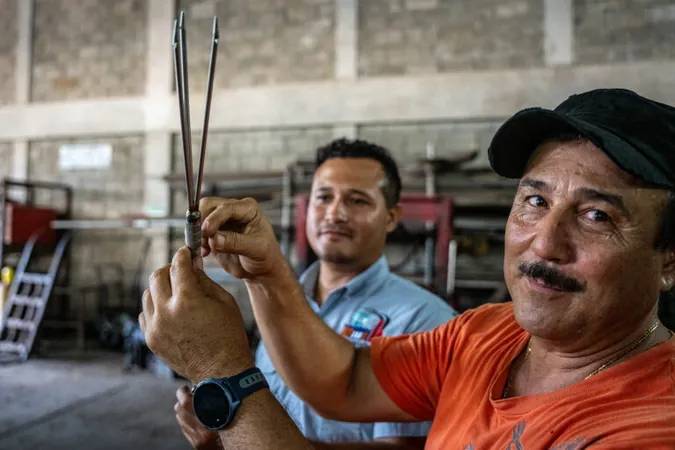
Father-Son Team Takes on Invasive Lionfish Crisis in Honduras
2024-11-18
Author: Li
Father-Son Team Takes on Invasive Lionfish Crisis in Honduras
TELA, Honduras — In a heartwarming tale of commitment and environmental stewardship, Mario Motiño Jr. and his father, Mario Motiño Sr., are battling the invasive lionfish species threatening the delicate coral reefs of Tela Bay, located on Honduras' northern coast. These striking yet destructive fish, known scientifically as Pterois volitans and P. miles, have flourished without natural predators in the Caribbean, wreaking havoc on local marine ecosystems. “They’re so confident, they don’t even swim away when we approach them with spears,” says the younger Motiño.
Desperate to protect the biodiversity of the area, the duo, both trained industrial engineers, have made it their mission to hunt lionfish, drastically limiting their spread and impact on the invaluable coral reefs. “Lionfish hunting is typically a luxury activity found on tourist islands, but here in Tela, we had to create our own gear to make it accessible for everyone,” explains Mario Sr. “The lionfish population has exploded because no one focused on hunting them along mainland coasts.”
The vibrant coral ecosystem in Tela Bay, comprising 68% live coral cover, is under siege from various threats. Overfishing has depleted key fish populations while climate change-induced coral bleaching has impacted nearly 40% of the larger Mesoamerican Reef. The arrival of lionfish is compounding these challenges, as they consume native fish species that play essential roles in maintaining the health of coral ecosystems.
“Lionfish reproduce at an alarming rate and prey on smaller fish that are critical for coral reef health,” warns Julio San Martín Chicas, principal program coordinator with the U.S.-based Coral Reef Alliance. “We're trying to encourage natural predators like sharks and groupers to hunt lionfish, but that is a long-term solution.” As part of their effort, the Motiños are also directly hunting lionfish, managing to catch between five and 25 of the invasive fish each dive.
Transitioning Careers: From Engineering to Eco-Warriors
The Motiños are not just random sea enthusiasts; they run one of the largest metal fabrication businesses in Honduras. Their journey into the underwater world began in 2014 when Mario Sr. took a diving course. This experience unlocked a passion for marine life, leading them to invest in diving gear and equipment. “We even retrofitted a dilapidated boat to suit our diving needs,” recalls Mario Jr.
Realizing specialized gear to protect them from lionfish’s venomous spines was too expensive or nonexistent on the mainland, the Motiños decided to take matters into their own hands. “Being engineers, we started building our own equipment with local materials,” Mario Jr. explains. They crafted unique spear designs and storage containers, ensuring safety and effectiveness.
The innovation doesn’t stop there; they’ve initiated lionfish hunting competitions in Tela Bay, drawing divers from across Honduras to raise awareness and manage the population. At a recent event in October, 21 divers sourced an impressive 140 lionfish — a testament to the growing efforts to combat the invasive species.
Community Impact and Future Goals
The Motiños donate their catches to local chefs, showcasing the culinary potential of lionfish when prepared correctly. “Having local people involved in conservation efforts is crucial,” notes San Martín Chicas. “Engaging community figures like the Motiños furthers the conversation on marine issues, especially within the business sector.”
Support from organizations like the Coral Reef Alliance has enabled Mario Jr. to participate in specialized training courses focused on reef conservation, igniting his ambition to study fish populations critical to the ecosystem’s recovery. “Reducing the lionfish is just the start; I’m eager to explore how we can bolster the health of our reefs,” he asserts.
The Motiño family business, Tela Divers, is evolving from a casual initiative into an organized community effort. They aim to register as a non-governmental organization (NGO) to broaden their reach and involve more community members in marine conservation. “Our ultimate goal is to cultivate a deep-rooted understanding and love for our marine environment,” Mario Sr. expresses.
The Road Ahead
Despite the challenges, local conservation efforts come at a crucial time as coral reefs face unprecedented decline. “The reef is in critical condition and requires immediate action,” San Martín Chicas emphasizes. The Motiños’ growing team of divers represents a hopeful stride towards a sustainable future for Tela Bay, and though the exact impact of their efforts is hard to quantify, it’s clear they are making waves in the fight against lionfish.
Now more than ever, the community's involvement in this ecological crisis is paramount, and as the Motiños continue their fight, they highlight the importance of perseverance and local engagement in safeguarding marine ecosystems.

 Brasil (PT)
Brasil (PT)
 Canada (EN)
Canada (EN)
 Chile (ES)
Chile (ES)
 España (ES)
España (ES)
 France (FR)
France (FR)
 Hong Kong (EN)
Hong Kong (EN)
 Italia (IT)
Italia (IT)
 日本 (JA)
日本 (JA)
 Magyarország (HU)
Magyarország (HU)
 Norge (NO)
Norge (NO)
 Polska (PL)
Polska (PL)
 Schweiz (DE)
Schweiz (DE)
 Singapore (EN)
Singapore (EN)
 Sverige (SV)
Sverige (SV)
 Suomi (FI)
Suomi (FI)
 Türkiye (TR)
Türkiye (TR)